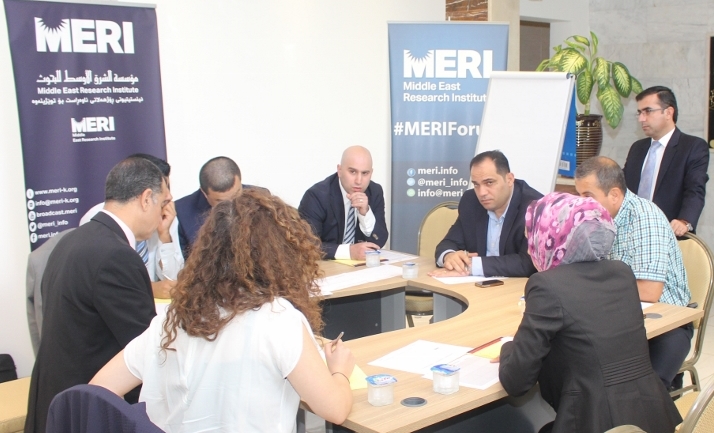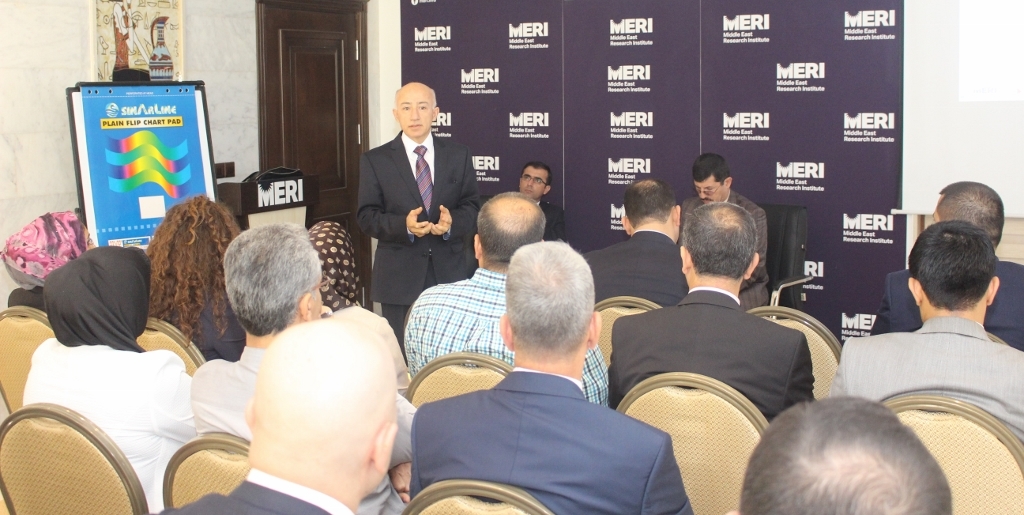An extremely challenging context for healthcare provision emerged in Iraq, and in Kurdistan Region in particular, due to the combination of both the displacement crisis and the substantial decrease in available public financial resources. This has intertwined with structural deficiencies in the public health provision that have historically hindered the effectiveness and quality of its service. In consequence, the vulnerable situation of most displaced households – mainly in relation to shelter and the fact that the public infrastructure is stretched beyond its limits – is exacerbating the risk of a health crisis. As the situation requires a thorough analysis of the challenges and effective strategies, the Middle East Research Institute hosted a policy workshop under the title of “Health System Challenges in the Face of the Humanitarian Crisis in Iraq.”

The workshop took place on Saturday October 24th, funded by the Liverpool School of Hygiene and Tropical Medicie, and organised collaboratively with the Health Policy Research Organisation, an independent centre that works to generate, disseminate, and translate evidence into health policy. The overall aim of the workshop was to identify the challenges hampering the provision of appropriate healthcare for the population in need across Iraq and the Kurdistan Region and to propose viable solutions.
Previous research undertaken by MERI indicated that the short-term humanitarian response has not adequately taken into account the stress posed on the existing socio-economic infrastructure.
The stakeholders, which included policy makers at the KRG’s Ministry of Health, health practitioners, humanitarian organisations, and civil society organisations, discussed potential short term solutions to enhance healthcare provision in crisis time. The short term approach, however, was complemented by the enumeration of longer term and structural reforms required to achieve a more resilient system that can service both the displaced and the host population in need.

This need to shift the emergency response in healthcare to a more development-based approach was highlighted by the workshop trainers, Dr. Hemin Najmadden and Dr. Abdufatah Hawrami. They pointed to the need to tackle inadequate governance and management in the public and private health sector through capacity and professional development tailored to the current needs of society.
In effect, the consensus reached in the workshop was that an effective emergency response is inevitably linked to improvement in the overall health service provision through strong policy initiatives. Previous research undertaken by MERI, soon to be publicly released, indicated that the short-term humanitarian response has not adequately taken into account the stress posed on the existing socio-economic infrastructure. The service capacity and management practices in place were not completely adequate even for the local community before the arrival of displaced families. The humanitarian crisis is, therefore, only aggravating the underlying issues in the provision of public goods and services both in Iraq and the Kurdistan Region in particular.
* * * * *
About MERI: The Middle East Research Institute is Iraq’s leading policy-research institute and think tank. It is an independent, entirely grant-funded not-for-profit organisation, based in Erbil, Kurdistan Region. Its mission is to contribute to the process of nation-building, state-building and democratisation via engagement, research, analysis and policy debates.
MERI’s main objectives include promoting and developing human rights, good governance, the rule of law and social and economic prosperity. MERI conduct high impact, high quality research (including purpose-based field work) and has published extensively in areas of: human rights, government reform, international politics, national security, ISIS, refugees, IDPs, minority rights (Christians, Yezidis, Turkmen, Shabaks, Sabi mandeans), Baghdad-Erbil relations, Hashd Al-Shabi, Peshmarga, violence against women, civil society. MERI engages policy- and decision-makers, the civil society and general public via publication, focused group discussions and conferences (MERI Forum).

